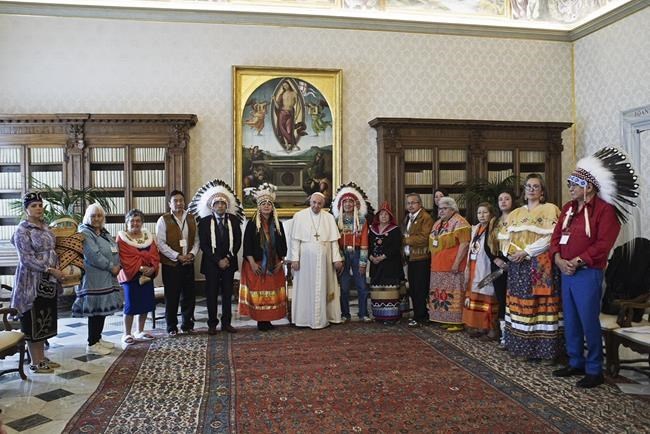Indigenous groups are welcoming news that Pope Francis plans to visit Canada this summer following his apology last month for the Roman Catholic Church's role in residential schools.
The Vatican said Friday that the pontiff is to stop in Alberta, Quebec and Nunavut, and that the capital cities of Edmonton, Quebec City and Iqaluit are to act as bases for the July 24 to July 29 trip.
The Confederacy of Treaty Six First Nations is working with The Holy See to plan the Pope's stop in Alberta, Grand Chief George Arcand said in a statement.
Edmonton is part of Treaty 6 territory, which spans central Alberta and Saskatchewan.
"I recognize the impact the Pope's visit will have in Treaty 6, to the survivors, their families and communities," Arcand said. "It is my hope we are on a path to healing and that survivors' truths are validated with this historic visit to our territories."
Grand Chief Rémy Vincent of the Huron-Wendat Nation in Wendake, Que., said Friday's announcement had been relatively well-received.
Wendake is an independent municipality but its two enclaves are surrounded by Quebec City.
"We must expect nothing less from the Church than to come to our territories here, in Quebec and in Canada, to apologize to the First Nations for the horrors that were committed and have been brought to light in recent years," he said in an interview Friday.
Vincent said he expects to meet Francis, but there has been no real interest from the community to have him visit Wendake.
"We’re not a very religious community," he said. "It’s also controversial here. You can’t hide it. There are people who are still very resentful, who are still bitter about what happened."
The Archbishop of Quebec, Cardinal Gerald Lacroix, said it will be a "true joy" to welcome the Pope and that the visit will build on the church’s efforts toward reconciliation.
"We've got to find a better way to live together and respect each other and be proud of who we are, our cultures, our languages, our way of expressing our faith. This will be very helpful,” he said.
The Union of British Columbia Indian Chiefs urged a change in itinerary to include the former Kamloops Residential School site. It's been almost a year since potential graves were discovered there in the first of what would be other shocking discoveries in Western Canada.
"First Nations in British Columbia have a profound sense of disappointment that after all of the ... trauma and concern over missing children and unmarked burials at the Catholic operated residential schools, there will be no visit to any of those sites," the chiefs said in a statement.
Chief Rosanne Casimir of the Tk'emlups te Secwepemc First Nation said it's a missed opportunity for the Pope to hear directly from the survivors of the former Kamloops Residential School.
"While we understand the vastness of Canada and the need to make the trip to Canada manageable for him, it is really unfortunate that he will not have the opportunity to come to Kamloops Residential School, the largest residential school in the country run by the Catholic Church," Casimir said.
"(Survivors) need to witness a true, meaningful apology from the highest level, from the Pope himself."
She said more than 200 First Nations were affected by the Kamloops Residential School and she hopes they will all have a chance to take part in his journey to Canada.
An estimated 150,000 Indigenous children were forced to attend residential schools in Canada and more than 60 per cent of the schools were run by the Catholic Church.
On April 1, after meetings over several days with First Nations, Inuit and Métis groups at the Vatican, Pope Francis apologized for the deplorable conduct of church members involved in residential schools. He also said he would visit Canada.
Indigenous delegates had told the Pope that they expected an apology to be delivered on Canadian soil.
The Métis National Council reiterated the need for a papal apology and also called for a commitment to act on truth, reconciliation, justice and healing.
President Cassidy Caron said the council wasn't consulted on the location choices.
"We hope that the Vatican will work closely with us in the spirit of reconciliation to ensure that there is adequate resourcing for any and all survivors who wish to attend," Caron said in a statement.
The Canadian Conference of Catholic Bishops said the Vatican selected the three cities based on the length of the trip, the vast size of Canada and the health of the 85-year-old pontiff.
Archbishop Richard Smith of Edmonton, general coordinator of the trip for the conference, said the Pope is limited in how he can travel. He can no longer ride in helicopters and can't be in a vehicle for more than an hour. He must also rest between events.
It is expected that Francis, despite his limitations, will travel to a former residential school site.
Smith said a formal program is to be developed with Indigenous partners.
Crown-Indigenous Relations Minister Marc Miller said it's important for Pope Francis to hear directly from survivors as it "not only offers an opportunity to apologize ... but also to develop better practices as to how you move forward."
Prime Minister Justin Trudeau said in a statement that the visit would not be possible without the "bravery and determination of the survivors, Indigenous leaders and youth who shared their stories" last month.
The Indian Residential Schools Resolution Health Support Program has a hotline to help residential school survivors and their relatives suffering trauma invoked by the recall of past abuse. The number is 1-866-925-4419.
This report by The Canadian Press was first published May 13, 2022.
— With files from Jacob Serebrin in Montreal and Daniela Germano in Edmonton
Brittany Hobson and Kelly Geraldine Malone, The Canadian Press



